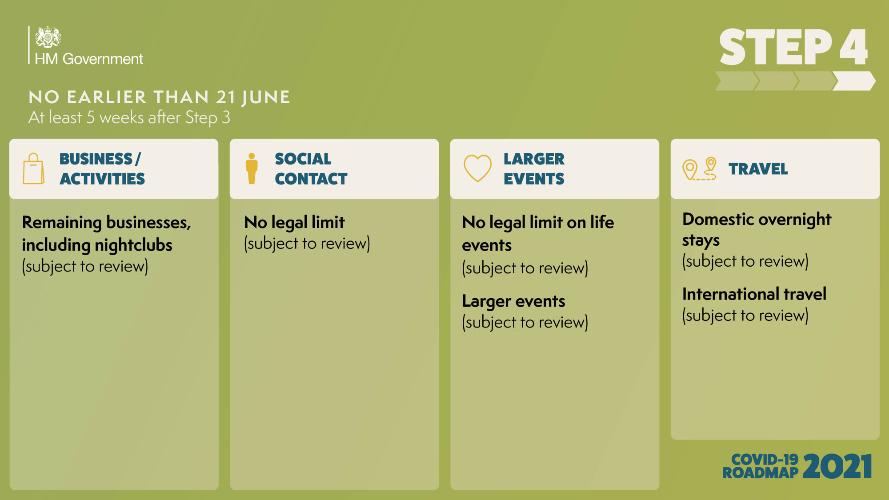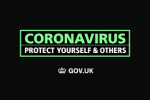
Step 4 of the Roadmap will proceed as planned on Monday 19 July, the Prime Minister has confirmed.
The majority of covid restrictions will end on 19 July and guidance will emphasise personal responsibility.
The latest data and modelling show that the government’s “four tests” for easing covid restrictions have been met.
The four tests are:
- the vaccine deployment programme continues successfully;
- evidence shows vaccines are sufficiently effective in reducing hospitalisations and deaths in those vaccinated;
- infection rates do not risk a surge in hospitalisations which would put unsustainable pressure on the NHS; and
- the government's assessment of the risks is not fundamentally changed by new Variants of Concern.
Cases will continue to rise as set out from the start of the Roadmap, but the vaccination programme has substantially weakened the link between infection and serious illness or death.
Hospitalisations and deaths will continue to rise over the coming weeks and months, but both are far lower than the previous wave. The current data does not suggest that unsustainable pressure will be put on the NHS but all data will be kept under constant review.
Vaccination programme
By 19 July two thirds of adults will have received two doses and every adult will have been offered a first dose. The move to Step 4 was delayed by 4 weeks so more adults could be vaccinated. Nearly 7 million vaccines have already been administered during the delay.
Data from PHE suggests that one dose of either the Pfizer-BioNTech or Oxford-AstraZeneca vaccine is 80% effective against hospitalisations with the Delta variant, increasing to 96% after two doses.
The vaccination programme will continue and all adults will be offered two doses by mid-September. Dependent on final JCVI advice the booster programme will begin from September, offering additional protection to the most vulnerable.
Ongoing guidance
The majority of legal restrictions will be removed and people will be expected to protect themselves and others through informed choice. The government expects and recommends that face coverings are worn in crowded and enclosed spaces, such as public transport, when mixing with people you don’t normally meet.
While the government is no longer instructing people to work from home, a return to the workplace should be gradual and businesses should follow the published guidance.
Organisations and large events will be supported and encouraged to use the NHS COVID Pass in high-risk settings to help limit the risk of infection in their venues.
Positive cases and contacts of positive cases identified by NHS Test and Trace will still be legally required to self-isolate, to help break chains of transmission. There will be an isolation exemption for contacts of positive cases for under 18s and for double vaccinated adults from 16 August. School bubbles will end from 19 July.
Travel
Quarantine rules will remain for all those travelling from a red list country, and for amber list countries unless double vaccinated.
Review
All data will be kept under review, and contingency measures will be retained to manage periods of higher risk, such as winter. Guidance will be strengthened if needed, but restrictions will be avoided if possible due to their significant economic, social and health costs.
The government will review the current guidance in September.



